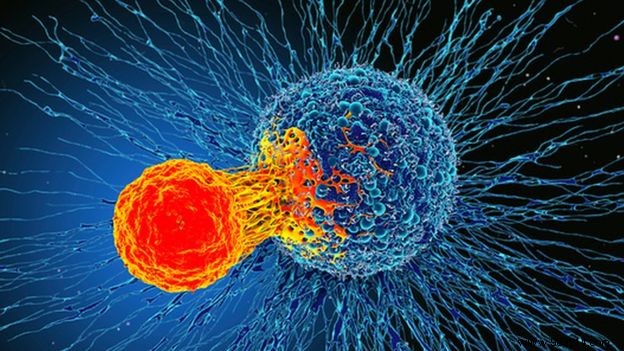An experimental virus that may fight the spread of cancer has been given to a human patient for the first time after successful trials in mice. The phase I trial will involve around 100 patients with metastatic solid tumours.
The drug candidate, called CF33-hNIS (or Vaxinia), contains a so-called oncolytic virus. It is a genetically modified virus, here a poxvirus, designed to selectively infect cancer cells. Healthy cells are therefore spared. The virus duplicates itself inside its targets which eventually burst. The process releases thousands of new virus particles that act like antigens , thereby stimulating the immune system to attack nearby cancer cells.
Previous research in mouse models has shown encouraging results. Until now, however, no tests had been carried out in humans. It is now done. The City of Hope cancer research and care center (Los Angeles) and the Australian biotechnology company Imugene (who are co-developing the treatment) have indeed announced that they have started a first clinical trial .
"Our previous research has demonstrated that oncolytic viruses can stimulate the immune system to respond and kill cancer, as well as stimulate the immune system to be more responsive to other immunotherapies “, details oncologist Daneng Li. “We believe CF33-hNIS has the potential to improve outcomes for our patients . »

As a very first clinical trial, this one will primarily aim to demonstrate that CF33-hNIS is safe for humans . Doctors will record the frequency and severity of any side effects. They will also study how well participants do when low doses are increased.
This trial will involve 100 patients adults with metastatic or advanced solid tumors who have already tried at least two standard lines of treatment. These individuals will receive low doses of the experimental treatment by direct injection or intravenously. They will then be followed for two years. A first patient enrolled in the trial has already received an injection.
If initial results are positive, further testing will aim to investigate how the drug combines with pembrolizumab . This is an existing antibody treatment already used in cancer immunotherapy.
If the drug proves to be safe and well tolerated, then we could be looking at a powerful new tool to fight cancer. CF33-hNIS (or Vaxinia) would then become the second FDA-approved oncolytic virus treatment for cancer. The first is a drug called Talimogene laherparepvec (T-VEC). It is a modified version of the herpes simplex virus used in the treatment of melanoma.